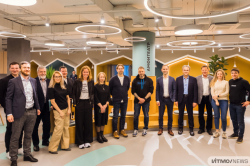According to Deputy Prime Minister Dmitriy Grigorenko, who also participated in the discussion, in order to make data a valuable resource for business, it’s necessary to ensure its collection, processing, and protection, as well as provide Russian citizens with equal access to it. A crucial step towards this objective is training enough IT professionals.
However, the lack of experts isn’t the industry’s only problem. It’s often the case that once young specialists are employed, they need to be additionally trained, says ITMO’s First Vice Rector Daria Kozlova. University educational programs can’t keep up with the market’s ever-changing demands, meaning that graduates enter the workplace without the necessary knowledge and skills. That’s why we see more and more major companies opening their own educational centers and developing educational programs. However, training high-profile experts is only possible through a collaboration between universities and big tech as they develop educational tracks together. This is true not only for qualifications, but also for data. It’s no longer effective to teach using imagined examples – in order to learn to solve real-world commercial cases at university, students need to work with real-world data, too; data that has been cleaned, structured, and verified. Such data can only be provided by big tech.
“Training IT specialists is not unlike training athletes. A country’s national team is formed from talents who entered their sport with a purpose, not from random people who train on their own. That’s the principle used by big techs to train their future employees. They focus not on the tens of thousands of IT enthusiasts, but on a select hundred or thousand – those who will make the “national team” of frontier developers. Thus, the industry is interested in teaching the super elite, those who will work on the technologies of the future – that’s why we need top experts teaching at universities. However, as big tech faced new challenges, the majority of such experts left universities for corporations. Now, it’s crucial to bring them back to the educational system so that they can share the relevant knowledge and experience of working with real-world technological cases,” said Daria Kozlova.

Daria Kozlova. Photo by Roscongress
Vladimir Stepanov, president of the Aquarius group, another participant of the discussion, stated that the new national program particularly focuses on training software developers. However, as these days the Russian economy is transitioning to domestic hardware it’s important to raise the prestige of the engineering profession – there is a lack of specialists in this area as well. Otherwise, IT specialists would simply have nothing to work on.
A question closely linked to the task of collecting and exchanging data is how it should be used. Based on the example of universities, Daria Kozlova said that not everyone is ready to work even with their own internal data – even if it could mean new opportunities for improving the quality of education. For instance, such data could be used to build efficient individual learning tracks for the future members of the “national IT team” that is so sought-after by big tech. Moreover, in the future, this data could be used to develop a recommendation system to support the decision-making of students at schools and universities.





